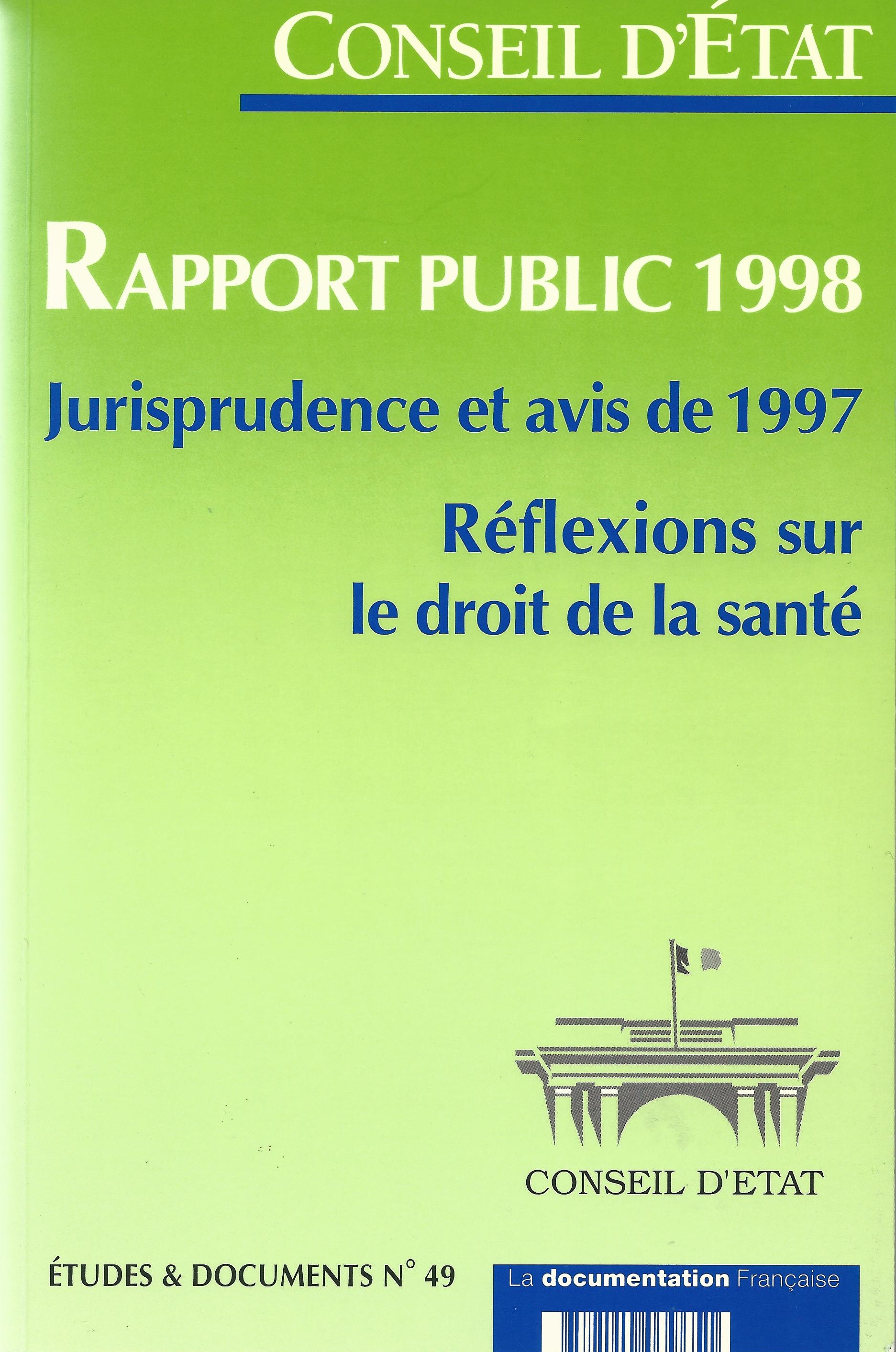Thesaurus : Doctrine
Référence complète : Lalande, P.-A., Le pouvoir d’injonction au service de la réparation du préjudice écologique : une mise en œuvre de l’office du juge administratif en matière climatique, Actu-Juridique, 9 décembre 2021.
____
_____

Feb. 8, 2025
MAFR TV : MAFR TV - Overhang

🌐suivre Marie-Anne Frison-Roche sur LinkedIn
🌐s'abonner à la Newsletter MAFR. Regulation, Compliance, Law
🌐s'abonner à la Newsletter Surplomb, par MAFR
____
► Référence complète : M.-A. Frison-Roche, "Qui est en charge de rendre effectif le dispositif de Compliance ? Plutôt l'entreprise ou plutôt l'Autorité publique ? Exemple des données : CE, 27 janvier 2025, B. c/ CNIL", in série de vidéos Surplomb, 8 févroer 2025
____
🌐visionner sur LinkedIn cette vidéo de la série Surplomb
____
____
🚧lire le document de travail bilingue sur la base duquel cette vidéo a été élaborée
____
► Résumé de ce Surplomb : Dans sa décision du 27 janvier 2025, le Conseil d'État eut à apporter une solution à un cas que les règles de Compliance applicable en matière de données n'avaient pas expressément prévu. Une personne qui estime qu'une autre a méconnu ses obligations imposées par le RGPD peut-elle saisir la CNIL et non pas le responsable de traitement ?
Le Conseil d'Etat estime que la question est claire, qu'il n'est pas utile de poser une question préjudicielle à la CJUE. En effet, les textes imposent à celui qui allègue la méconnaissance de son droit de se tourner d'abord vers le responsable du traitement pour que l'information soit effacée avant de saisir dans un second temps la CNIL. En outre, il s'agissait en l'espèce d'informations personnelles insérées par des médecins dans un rapport d'expertise versé dans une instance judiciaire. Le Conseil d'Etat approuve la CNIL d'avoir estimé qu'elle n'a pas à contrôler et à apprécier les éléments de preuve, ce qui relève de l'office du juge judiciaire.
L'on mesure ici que, si par ailleurs sur la base du droit d'alerte la saisine d'autorités administratives peut être directe, ici le spécifique l'emporte sur le général, l'esprit de la loi confiant la préservation directe des droits au responsable du traitement, la CNIL ne devant venir dans son office de supervision et de hashtag#sanction que dans un second stade. Cela illustre ce qu'est le Droit de la Compliance d'une façon plus générale, qui repose en premier lieu sur les opérateurs eux-mêmes. En outre, creuset de droits subjectifs divers, ici droit à l'hashtag#effacement mais aussi droit de verser des preuves aux débats, le Conseil d'Etat souligne que c'est ici l'office du juge judiciaire de veiller à la loyauté des débats.
____
🎬visionner ci-dessous cette vidéo de la série Surplomb⤵️
____
Surplomb, par mafr
la série de vidéos dédiée à la Régulation, la Compliance et la Vigilance
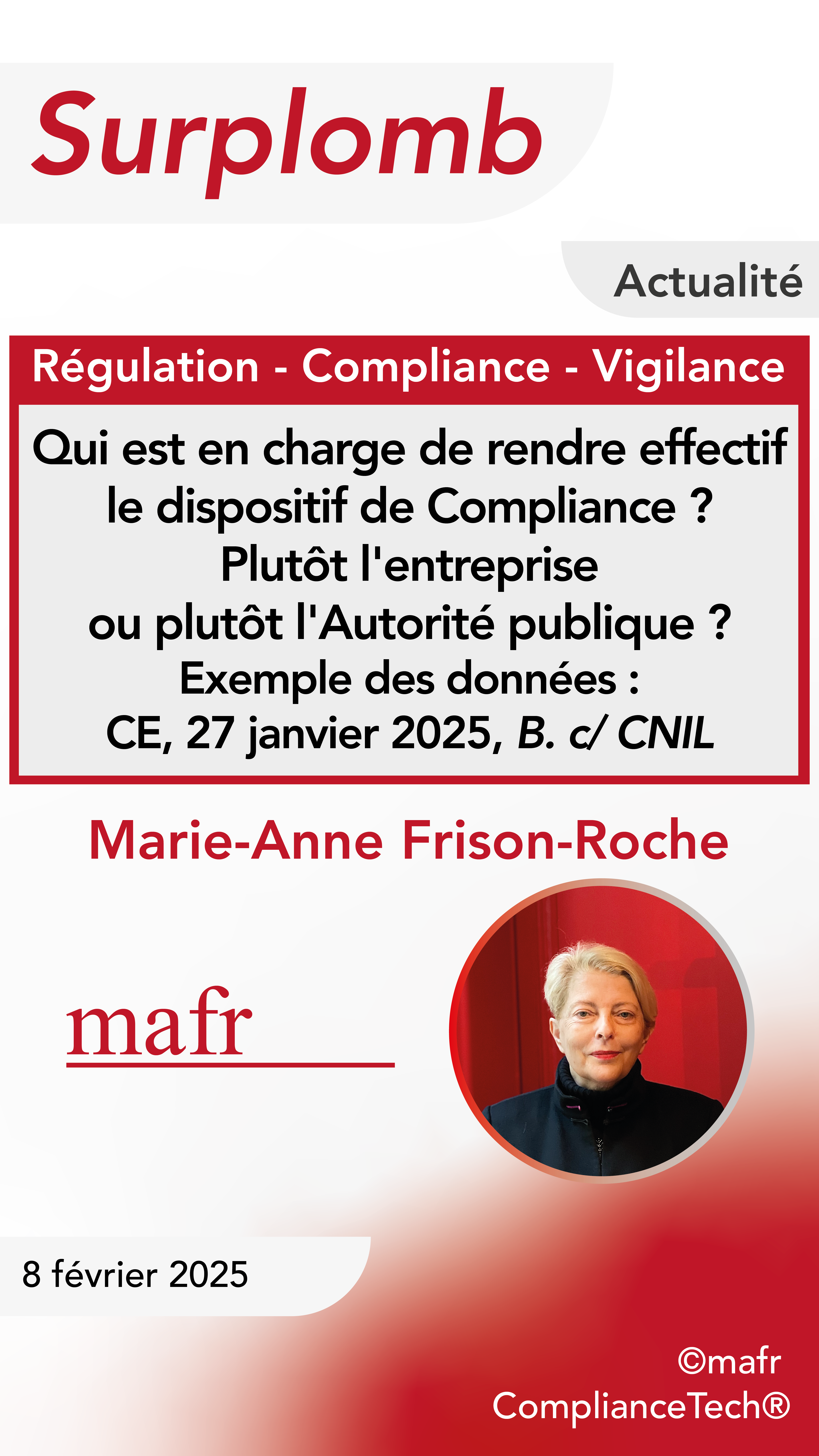


Jan. 18, 2025
Publications

🌐follow Marie-Anne Frison-Roche sur LinkedIn
🌐subscribe to the Newsletter MAFR Regulation, Compliance, Law
🌐subscribe to the Video Newsletter MAFR Surplomb
____
 ► Full Reference: M.-A. Frison-Roche, Status and Role of the 'trajectory' in Regulatory and Compliance Law, Working Paper, January 2025.
► Full Reference: M.-A. Frison-Roche, Status and Role of the 'trajectory' in Regulatory and Compliance Law, Working Paper, January 2025.
____
🎤 This Working Paper was developed as a basis for the Overhang👁 video on 18 January 2024 : click HERE (in French)
____
🎬🎬🎬In the collection of the Overhangs👁 It falls into the Notions category.
►Watch the complete collection of the Overhangs👁 : click HERE
____
► Summary of this Working Paper: The notion of Trajectory is a key concept in Compliance Law. This is shown in 4 steps.
- 1. the decisive use of the trajectory in the 3 Grande-Synthe decisions of the French Conseil d'Etat,
- 2. defining the trajectory,
- 3. the application of the trajectory in various sectoral Compliances and Compliance tools,
- 4. the probationary dimension of the trajectory and the consequences for subjected entities
____
🔓read the developments below⤵️
Dec. 27, 2024
Thesaurus : 03. Conseil d'Etat
► Référence complète : CE, sect. du contentieux, 6ème et 5ème ch. réunies, 27 déc. 2024, n° 498210, Association des avocats pénalistes
____
________
Oct. 24, 2024
Thesaurus : 03. Conseil d'Etat
► Référence complète : CE, Ass., 24 octobre 2024, 465144, Mutuelle centrale de réassurance (MCR)
____
________
June 20, 2024
Thesaurus : Doctrine
► Référence complète : V.-O. Dervieux, "Israël à Eurosatory : la justice éparpillée « façon puzzle » ?", Actu-Juridique.fr, 20 juin 2024.
____
April 4, 2024
Publications
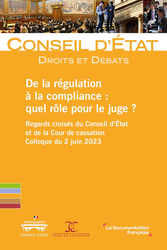
🌐follow Marie-Anne Frison-Roche on LinkedIn
🌐subscribe to the Newsletter MAFR Regulation, Compliance, Law
____
► Full Reference: M.-A. Frison-Roche, "Le rôle du juge dans le déploiement du droit de la régulation par le droit de la compliance" ("Synthesis: The role of the Judge in the deployment of Regulatory Law through Compliance Law"), Synthesis in Conseil d'État (French Council of State) and Cour de cassation (French Court of cassation), De la régulation à la compliance : quel rôle pour le juge ? Regards croisés du Conseil d'Etat et de la Cour de cassation - Colloque du 2 juin 2023, La Documentation française, "Droits et Débats" Serie, 2024, pp. 173-182
____
____
🚧read the bilingual Working Paper which is the basis of this article, with additional developments, technical references and hyperlinks
____
► Presentation of this concluding article: It is remarkable to note the unity of conception and practice between professionals who tend to work in administrative jurisdictions and professionals who tend to work in judicial jurisdictions: they all note, in similar terms, an essential movement: what Regulatory Law is, how it has been transformed into Compliance Law, and how in one and even more so in the other the Judge is at the centre of it.
Judges, as well as Regulators and European officials, explain this and use different examples to illustrate the far-reaching changes it brings to the Law and to the companies responsible for increasing the systemic effectiveness of the rules through the practice and dissemination of a Culture of Compliance.
The role of the judge participating in this Ex Ante transformation is renewed, whether he/she is a judge of Public Law or a judge of Private Law, in a greater unity of the legal system.
____
► English Summary of this article: The tug-of-war between 'Compliance' and 'conformity', which is exhausting us, obscures what is essential, i.e. the great novelty of a branch of law that assumes a humanist vision expressing the ambition to shape the future so that it is not catastrophic (preventing systems from collapsing), or even better (protecting human beings in these systems).
The article begins by describing the emergence of Compliance Law, as an extension of Regulatory Law and going beyond it. This new branch of law takes account of our new world, brings its benefits and seeks to counter these systemic dangers so that human beings could be their beneficiaries and are not crushed by them. This branch of Ex Ante Law is therefore political, often supported by public Authorities, such as Regulatory Authorities, but today it goes beyond sectors, as shown by its cutting edge, the Obligation of Vigilance.
The "Monumental Goals" in which Compliance Law is normatively anchored imply a teleological interpretation, leading to an "empowerment" of the crucial operators, not only States but also companies, responsible for the effectiveness of the many new Compliance Tools.
The article goes on to show that Judges are increasingly central to Compliance Law. Lawsuits are designed to make companies more accountable. In this transformation, the role of the judge is also to remain the guardian of the Rule of Law, both in the protection of the rights of the defence and in the protection of secrets. Efficiency is not what defines Compliance, which should not be reduced to a pure and simple method of efficiency, which would lead to being an instrument of dictatorship. This is why the principle of Proportionality is essential in the judge's review of the requirements arising from this so powerful branch of Law.
The courts are thus faced with a new type of dispute, of a systemic nature, in their own area, which must not be distorted: the Area of Justice.
____
📝read article (in French)
________
March 11, 2024
Interviews

🌐follow Marie-Anne Frison-Roche on LinkedIn
🌐subscribe to the Newsletter MAFR Regulation, Compliance, Law
____
► Full Reference: M.-A. Frison-Roche, "You Porn : La CJUE face au défi de la protection des mineurs" ("You Porn: The CJEU faces the challenge of protecting minors"), interview with Olivia Dufour, Actu-Juridique, March 11, 2024
____
💬read the interview (in French)
____
► Presentation of the interview by the journal (in French): "Depuis bientôt deux ans, l’Arcom tente de contraindre les sites pornographiques à mettre en place des procédés techniques sérieux de contrôle d’âge des internautes qui accèdent à leurs sites, afin que la protection des mineurs organisée par le droit pénal soit effective. Il y a à la fois une procédure civile en cours, basée notamment sur le décret qui met en œuvre ce dispositif, et un recours administratif, contestant la légalité du décret sur lequel s’appuie le régulateur pour mettre en demeure les sites d’adopter ces dispositifs techniques. Dans ce dernier contentieux, le Conseil d’État a, par sa décision du 6 mars 2024, adressé plusieurs questions préjudicielles à la CJUE pour déterminer quelle était la marge de manœuvre des États membres à l’encontre des sites qui ne respectent pas leur législation. Nous avons demandé au professeur Marie-Anne Frison-Roche, spécialiste de droit de la compliance, de nous éclairer sur les enjeux de ce contentieux hors normes.".
____
► Questions asked (in French):
- Pouvez-vous nous rappeler brièvement la genèse de ce cas manifestement complexe ?
- C’est la première fois qu’apparaît dans une décision de justice la notion de « cause systémique » dont vous êtes l’auteure. De quoi s’agit-il exactement ?
- Sur ces entrefaites, une décision de la CJUE est venue bouleverser la donne…
- Revenons au recours devant le Conseil d’État contre le décret, il semble que le Conseil d’État avait donc le choix entre deux solutions : suivre la CJUE et donc renoncer à protéger les enfants de la pornographie en France ou bien s’émanciper de cette jurisprudence européenne au risque de se le voir reprocher. Qu’a-t-il décidé finalement ?
________
July 5, 2023
Interviews

♾️follow Marie-Anne Frison-Roche on LinkedIn
♾️subscribe to the Newsletter MAFR Regulation, Compliance, Law
____
► Full Reference: M.-A. Frison-Roche et A. Seban, "Compliance : les cours suprêmes s’emparent de la question de ses enjeux juridictionnels" ("Compliance : the Supreme Courts take up the issue of its jurisdictional implications"), interview with Olivia Dufour, Actu-Juridique, 5 July 2023.
____
💬read the interview (in French)
____
► Presentation of the interview by the journal (in French): "Le 2 juin dernier s’est tenu au Conseil d’État un colloque fondateur sur le rôle du juge dans la compliance. Le professeur Marie-Anne Frison-Roche et le conseiller d’État Alain Seban, qui ont tout deux contribué aux débats, ont accepté de commenter les principaux enseignements des travaux de cette journée."
____
► Questions asked (in French):
- Le colloque « De la régulation à la compliance, quel rôle pour les juges » qui s’est tenu au Conseil d’État le 2 juin dernier a rassemblé juges civils et administratifs. En quoi le juge administratif est-il concerné par la compliance qui semble plutôt une affaire d’entreprises et donc de justice civile et commerciale ?
- Vincent Vigneau, président de la chambre commerciale de la Cour de cassation rappelle que la compliance a plutôt vocation à éviter le juge en se situant ex ante, pourtant on découvre que le juge lui-même accepte de plus en plus de se prononcer en ex ante… qu’en est-il ?
- Quel peut donc être le rôle du juge dans la compliance ? Peut-il contribuer à faire émerger un droit de la compliance et à l’harmoniser ?
- François Ancel semble considérer que le rôle juge va devoir adapter son office à la compliance, il évoque trois concepts : téléologique, soutenabilité et efficacité…
- Le juge dispose-t-il en l’état de tous les outils nécessaires ? Si tel n’est pas le cas, que faut-il créer ?
- En quoi le dialogue des juges, civil/administratif, national/européen, national/international, est-il important ?
- Que veut dire F. Ancel quand il déclare que le juge doit évoluer du constat à la trajectoire ?
- Existe-t-il des domaines où la compliance entre en conflit avec des principes processuels, par exemple le principe de légalité des peines ?
- En quoi la notion de « buts monumentaux », que vous avez créée en 2016, a-t-elle trouvé sa place dans le droit ?
________
June 28, 2023
Newsletter MAFR - Law, Compliance, Regulation

♾️suivre Marie-Anne Frison-Roche sur LinkedIn
♾️s'abonner à la Newsletter MAFR Regulation, Compliance, Law
____
► Référence complète : M.-A. Frison-Roche, "S'engager n'est pas contracter (décision du Conseil d'État du 21 avril 2023, Orange c/ Arcep)", Newsletter MAFR Law, Compliance, Regulation, 28 juin 2023.
____
📧Lire par abonnement gratuit d'autres news de la Newsletter MAFR - Law, Compliance, Regulation
____
🔴Engagements, acceptation, convention : multiplication de ces actes de volonté acceptés qui ne sont pourtant pas des contrats et échappent à leurs principes
Dans sa décision du 21 avril 2023, société Orangec/ Arcep, le Conseil d'État dit ce que ne constitue pas les engagements souscrits par l'opérateurs pour le déploiement de la fibre, acceptés par le ministre : ce n'est pas un contrat. La "qualification négative" est donc donnée. Mais alors qu'est-ce que c'est ?
____
📧lire l'article ⤵️
June 2, 2023
Conferences
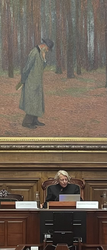
🌐follow Marie-Anne Frison-Roche on LinkedIn
🌐subscribe to the Newsletter MAFR Regulation, Compliance, Law
____
► Full Reference: M.-A. Frison-Roche, Le rôle du Juge dans le déploiement du Droit de la Régulation en Droit de la Compliance (The role of the Judge in the deployment of Regulatory Law in Compliance Law), in Conseil d'État (French Administrative Supreme Court) and Cour de cassation (French Judiciaire Supreme Court of cassation), De la Régulation à la Compliance : quel rôle pour le Juge ? ("From Regulatory to Compliance : what role for the judge?"), speech constituting the "closing session" of the bi-annual joint symposium of the two High Courts, held at the Conseil d'Etat, Salle d'Assemblée générale, 2 June 2023.
The event was held in French.
____
🧮See the full programme of this event (in French)
____
🎥watch the interview given about the conclusion, done after the speech (in French)
____
🧮read the general programme of the manifestation (in French)
____
📚read the bibliographical dossier du participant. (participant's file made in French)
___
🎥watch the general introductory speechs of Didier-Roland Tabuteau, Vice-Président du Conseil d'Etat, de Christophe Soulard, Premier Président de la Cour de cassation, and of François Molins, Procureur général près la Cour de cassation ; and the interventions in the first session devoted to the path from the Regulatory to the Compliance with Marie-Anne Barbat-Layani, présidente de l'AMF, Jean-Yves Ollier, conseiller d'Etat, Daniel Calleja-Crespo, directeur général du service juridique de la Commission européenne andChristine Guegen, , première avocate générale de la chambre commerciale de la Cour de cassation
____
🎥watch the speechs in the second session devoted to the office of the judge with Vincent Vigneau, président de la chambre commerciale de la Cour de cassation, François Ancel, conseiller à la première chambre civile de la Cour de cassatin, Astrid Mignon-Colombet, avocate à la Cour, Lucien Rapp, professeur à Toulouse-Capitol and Alain Seban, conseiller d'Etat ; the speechs of the third session dedicated to the Compliance new frontiers, with Christophe Chantepy, président de la section du contentieux du Conseil d'Etat, Roch-Olivier Maistre, président de l'Arcom, Paul Nihoul, juge au Tribunal de l'Union européenne, Jean-François Bohnert, procureur de la République financier, Joëlle Tolédano, professeure émérite à Dauphine ; the final session with Marie-Anne Frison-Roche
____
🎥watch this final speech by Marie-Anne Frison-Roche, which formed the closing session of the event
____
🚧read the bilingual Working Paper used as basis for the article to be published later
____
____
► English presentation of this general conclusion: Having a definition of Compliance Law in mind, a definition around which there still seems to be so much dispute, is not required to understand that this Law is what will enable us to enter and deal with a new world and if this subject is so fascinating to young people who want to become lawyers, prosecutors, regulators or judges, even though they are not taught this subject, it is because they have understood that with Compliance Law they will be able to actively participate in this new world and build it. This is the way we want it to take it, with force and courage in a sort of collective adventure. In this way, the Judges have a monumental role to play, which is at the very heart of Compliance Law.
They will necessarily be so because demands and claims will converge on them from all sides, from Internet users, consumers, investors, associations and companies, and the Judge will have to respond. This has already started and is only just beginning. Judges must be prepared.
Four expectations are emerging as to what their role should be.
Firstly, judges must persist in their role as guardians of the Rule of Law, in a Compliance Law impregnated with technologies (algorithms) that could be described as insensitive.
Secondly, beyond this vital role as guardian of the Rule of Law, the Judge has a new role in the extraordinary deployment of Compliance Law, which is measured in terms of the novelty of the normative control it exercises, the commitments it supports, the remedies it finds and the sustainability it reinforces.
Thirdly, in the natural space of justice, the judge responds to parties who make claims of compliance, both as plaintiff and defendant, because the causes of compliance are systemic causes that deserve a new jurisdictional treatment.
Fourthly, given the novelty and scope of this innovative approach, all judges must converge in terms of content, qualifications, and methods if they are both to continue their traditional role as guardians of the Rule of Law and to be able to endure their new role, a dialogue in which they have so much to contribute to each other.
________
May 29, 2023
Newsletter MAFR - Law, Compliance, Regulation
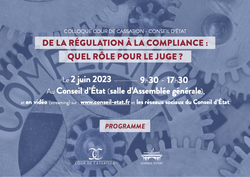
♾️suivre Marie-Anne Frison-Roche sur LinkedIn
♾️s'abonner à la Newsletter MAFR Regulation, Compliance, Law
____
► Référence complète : M.-A. Frison-Roche, "Compliance-Vigilance-Régulation : que feront les juges demain ? Juges administratif, civil, pénal, commercial, européen, etc. Colloque 2 juin 2023", Newsletter MAFR Law, Compliance, Regulation, 29 mai 2023.
____
📧Lire par abonnement gratuit d'autres news de la Newsletter MAFR - Law, Compliance, Regulation
____
🔴 Ce que les juges ont à nous dire sur la Compliance et la Régulation (2 juin 2023)
Chacun perçoit que les juges sont très puissants dans le Droit de la compliance, par exemple dans le numérique ou en matière de vigilance. Ils le sont aujourd'hui, le seront encore plus demain. Mais comment vont-ils exercer cette puissance, comment conçoivent-ils leur rôle, comment vont-ils exercer leur office face aux régulateurs, aux entreprises, aux personnes impliqués dans des systèmes technologiques qui risquent de nous dépasser ? Le 2 juin 2023 le Conseil d'État et la Cour de cassation se réunissent pour discuter et formuler le rôle du juge dans ce passage qui s'opère du Droit de la régulation au Droit de la compliance. J'attends d'apprendre à travers ce que je vais écouter toute la journée et explicite ici le contenu, les enjeux et les modalités d'inscription de ce colloque conçu par nos deux Hautes juridictions.
____
📧lire l'article ⤵️
May 10, 2023
Thesaurus : 03. Conseil d'Etat
► Full Reference: Conseil d'État (French Council of State), 6th and 5th chambers reunited, 10 May 2023, n° 467982, Commune de Grande-Synthe (so-called Grande-Synthe III).
____
🏛️read the decision (in French)
________
Nov. 19, 2020
Thesaurus : 03. Conseil d'Etat
► Full Reference: Conseil d'État (French Council of State), 6th and 5th chambers reunited, 19 November 2020, n° 427301, Commune de Grande-Synthe (so-called Grande-Synthe I).
____
🏛️read the decision (in French)
________
Oct. 22, 2020
Interviews

Full reference: Frison-Roche, M.-A., "Health Data Hub est un coup de maître du Conseil d'Etat", interview realized by Olivia Dufour for Actu-juridiques, Lextenso, 22nd of October 2020
Read the news of 19th of October 2020 of the Newsletter MAFR - Law, Compliance, Regulation on which relies this interview: Conditions for the legality of a platform managed by an American company hosting European health data: French Conseil d'Etat decision
To go further, on the question of Compliance Law concerning Health Data Protection, read the news of 25th of August 2020: The always in expansion "Right to be Forgotten": a legitimate Oxymore in Compliance Law built on Information. Example of Cancer Survivors Protection
Oct. 19, 2020
Newsletter MAFR - Law, Compliance, Regulation

Full reference: Frison-Roche, M.-A., Conditions for the legality of a platform managed by an American company hosting European health data: French Conseil d'Etat decision, Newsletter MAFR - Law, Compliance, Regulation, 19th of October 2020
Read by freely subscribing the other news of the Newsletter MAFR - Law, Compliance, Regulation
___
News Summary: In its ordinance of 13th of October 2020, Conseil national du logiciel libre (called Health Data Hub), the Conseil d'Etat (French Administrative Supreme Court) has determined the legal rules governing the possibility to give the management of sensitive data on a platform to a non-europeans firm, through the specific case of the decree and of the contract by which the management of the platform centralizing health data to fight against Covid-19 has been given to the Irish subsidiary of an American firm, Microsoft.
The Conseil d'Etat used firstly CJEU case law, especially the decision of 16th of July 2020, called Schrems 2, in the light of which it was interpreted and French Law and the contract linking GIP and
The Conseil d'Etat concluded that it was not possible to transfer this data to United-Sates, that the contract could be only interpreted like this and that decree and contract's modifications secured this. But it observed that the risk of obtention by American public authorities was remaining.
Because public order requires the maintenance of this platform and that it does not exist for the moment other technical solution, the Conseil d'Etat maintained the principle of its management by Microsoft, until a European operator is found. During this, the control by the CNIL (French Data Regulator), whose the observations has been taken into consideration, will be operated.
We can retain three lessons from this great decision:
- There is a perfect continuum between Ex Ante and Ex Post, because by a referred, the Conseil d'Etat succeed in obtaining an update of the decree, a modification of the contractual clauses by Microsoft and of the words of the Minister in order to, as soon as possible, the platform is managed by an European operator. Thus, because it is Compliance Law, the relevant time of the judge is the future.
- The Conseil d'Etat put the protection of people at the heart of its reasoning, what is compliant to the definition of Compliance Law. It succeeded to solve the dilemma: either protecting people thanks to the person to fight against the virus, or protecting people by preventing the centralization of data and their captation by American public authorities. Through a "political" decision, that is an action for the future, the Conseil found a provisional solution to protect people against the disease and against the dispossession of their data, requiring that an European solution is found.
- The Conseil d'Etat emphasized the Court of Justice of The European Union as the alpha and omega of Compliance Law. By interpreting the contract between a GIP (Public interest Group) and an Irish subsidy of an American group only with regards to the case law of the Court of Justice of European Union, the Conseil d'Etat shows that sovereign Europe of Data can be built. And that courts are at the heart of this.
___________
Read the interview given on this Ordinance Health Data Hub
To go further about the question of Compliance Law concerning health data protection, read the news of 25th of August 2020: The always in expansion "Right to be Forgotten": a legitimate Oxymore in Compliance Law built on Information. Example of Cancer Survivors Protection
April 26, 2018
Thesaurus : 03. Conseil d'Etat
Oct. 20, 2017
Thesaurus : 01. Conseil constitutionnel
June 22, 2017
Thesaurus : Doctrine
Référence : Broussolle, Y., Les principales dispositions de l'ordonnance du 9 mars 2017 relative aux actions en dommages et intérêts du fait des pratiques anticoncurrentielles, Petite affiche, juin 2017, n°124, pp. 7-11.
Les étudiants de Sciences po peuvent lire l'article via le drive dans le dossier "MAFR - Régulation"
Lire l'Ordonnance ici commentée.
June 10, 2016
Thesaurus : Soft Law
Full reference: Sauvé, J. M., Les entreprises publiques, Introductive speech to the conference "les entretiens du Conseil d'Etat en Droit public économique" (Conseil d'Etat's colloquium in Economic Public Law), 10 juin 2016
April 12, 2016
Thesaurus : Soft Law
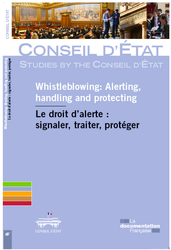
Full reference: Conseil d'Etat, Whistleblowing: reporting, handling and protecting, Annual study adopted by the Assemblée générale plénière (Plenary General Assembly), 2016
April 17, 2014
Publications
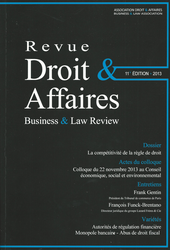
►Référence complète : M.-A. Frison-Roche, "Les décisions des juges et des régulateurs favorisent-elles la compétitivité des entreprises françaises ?", in Revue Droit & Affaires, La compétitivité de la règle de droit, 11ième vol., Université Panthéon-Assas, avril 2014, p.140-157.
____
►Résumé de l'article : l'essentiel pour qu'une entreprise et/ou une place puissent se développer tient à ce qu'elle puisse anticiper.
Parce que le sujet porte sur le juge et le régulateur, et non pas sur toutes les sources du droit, ce qui mènerait sinon à traiter du thème de la sécurité juridique, il convient de déterminer ce que les entreprises sont en droit d'attendre d'un juge ou d'un régulateur.
Une entreprise est en train d'attendre de ceux-ci qu'ils ne soient pas "discrétionnaires", car ils n'ont pas de légitimité à l'être et l'effet de surprise est nuisible à l'économie.
Pour éviter des marges excessives de discrétion, il est inutile de fait de contrôler le juge, car il est lui-même le contrôleur et l'on s'épuise à chercher le gardien du gardien.
Le seul moyen est l'observation par l'autorité de régulation et par les juridictions d'une cohérence de principes auxquels elles se tiennent.
Dans le vocabulaire nord-américain, cela est désigné comme la "doctrine" des administrations et des cours.
Ainsi, la compétitivité de l'économie française sera favorisée par les régulateurs et par les juges, non pas parce qu'ils seraient plus doux, cléments et libéraux, mais parce qu'ils se tiendraient à une doctrine, laquelle réduiraient leur marge de discrétion, qui est la pire des choses pour la sécurité des investissements et de l'action vers le futur, définition même de l'entreprise.
____
Lire la quatrième de couverture du volume dans lequel la contribution a été publiée.
____
🧮 lire la présentation du colloque, son programme et la présentation de l'intervention orale, dont les slides.
____
📝lire l'article
____
🚧Lire le document de travail à partir duquel la présentation orale a été construite, duquel l'article a été tiré. Ce Working Paper a été ultérieurement mis à jour, en fonction de l'activité, les dates de mises à jour étant alors successivement mentionnées
________
June 4, 2013
Thesaurus : Doctrine
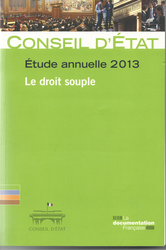
► Référence complète : Conseil d'État, Le droit souple, Étude Annuelle 2013, La documentation française, 2013, 294 p.
____
📗lire la 4ième de couverture
____
📗lire l'avant-propos
____
📗lire la table des matières
________
Feb. 23, 2000
Thesaurus : 03. Conseil d'Etat
► Référence complète : CE, Ass., 23 février 2000, n° 195715, Labor Metal
____
________
Oct. 10, 1998
Thesaurus : Doctrine
